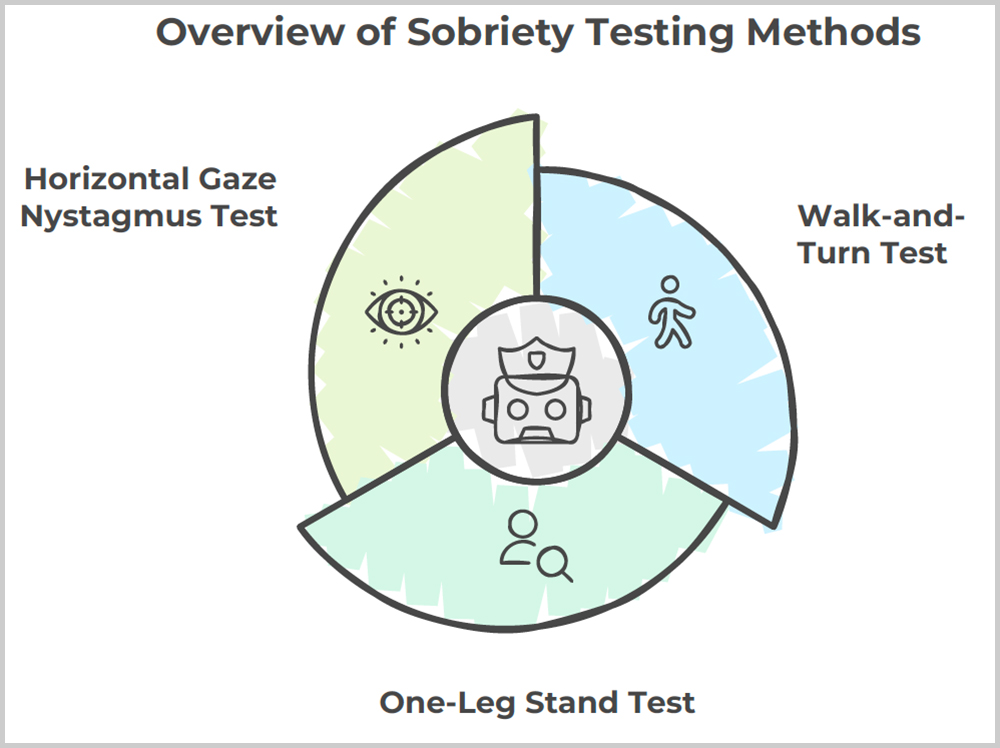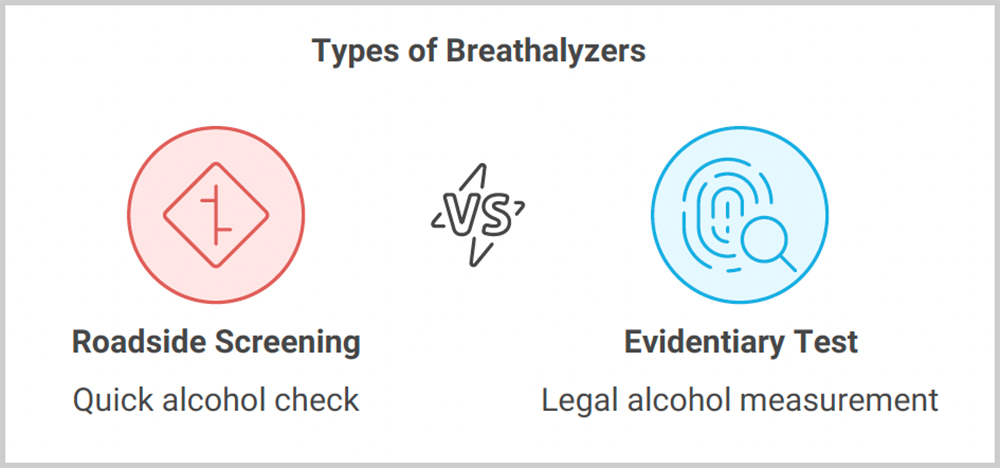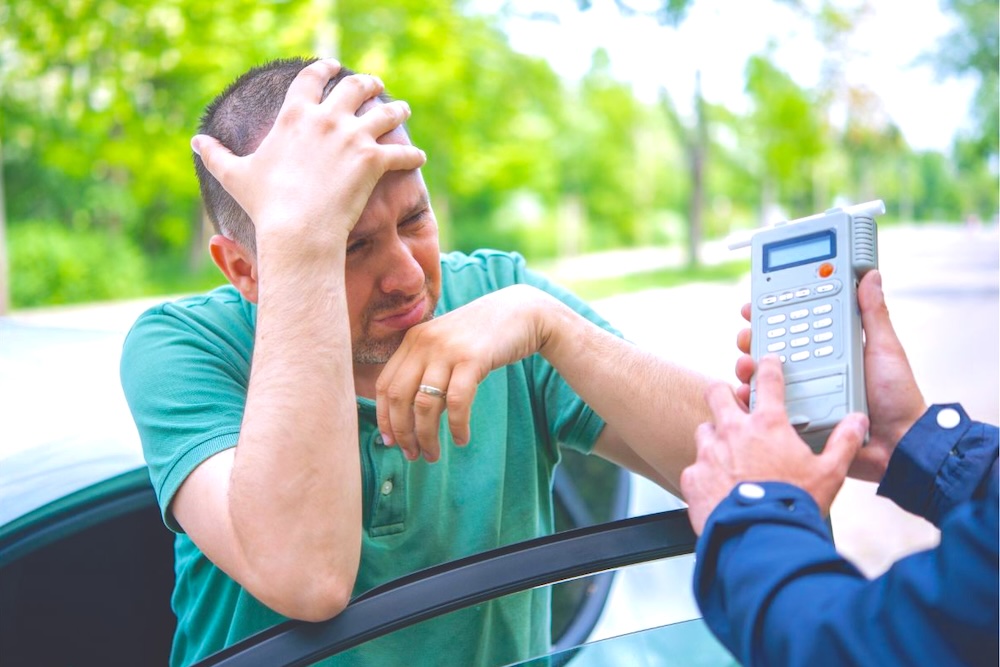Sobriety Tests in Canada: How Are They Performed?
Last Updated: September 13, 2024
Sobriety tests are modes of assessment used by the police to determine if someone is influenced by the use of alcohol or drugs. These tests are typically administered in the context of impaired driving.
The police use these tests not only to monitor the roads for safety but also as a way to gather evidence against those they suspect are driving under the influence.
Driving is a day-to-day activity for almost all Canadians, so it is important that all drivers understand sobriety tests. Knowing what sobriety tests are, as well as how and why they are conducted, can help Canadian drivers understand their rights and responsibilities in regard to them.
For instance, many drivers may be unaware that it is actually against the law for a driver to refuse a breathalyzer test when the police is demanding it. Understanding sobriety tests can empower Canadian drivers to make informed and responsible choices when driving and interacting with law enforcement.
Types of Sobriety Tests in Canada
There are many different kinds of sobriety tests used in Canada to help the police determine different kinds of information.
The first kind of tests are Field Sobriety Tests or FSTs. FSTs include the Walk-and-Turn test, the One-Leg Stand test and the Horizontal Gaze Nystagmus test. These tests give the police “clues” as to whether or not you are under the influence of alcohol or drugs.

They are discussed here in greater detail:
- Walk-and-Turn Test – this test involves the police officer asking you to walk in a straight line, heel to toe.
- One-Leg Stand Test – this test involves the police officer asking you to stand and balance on one foot.
- Horizontal Gaze Nystagmus (HGN) Test – this test involves the police officer asking you to follow an object (usually a penlight) with just your eyes as they move it from side to side. The next kind of tests are Breathalyzer Tests, which are most commonly used to determine blood alcohol levels.
The police do not have to necessarily have concrete proof that you have been drinking to administer this test. They might ask you to perform it, even if you were stopped for something unrelated to drinking or driving. It is important for Canadian drivers to remember that refusing a breathalyzer test is considered a criminal offence.

There are two kinds of breathalyzer tests:
- Roadside Screening Devices – This device is formally called an “Approved Screening Device”. It is a quick way to measure how much alcohol is in your body. While it does not provide a numerical alcohol content, it is used by police officers to see if they should do further testing on you.
- Evidentiary Breath Tests – This test involves you providing breath samples into a tool called a breathalyzer. This gives the police a numerical measurement of the amount of alcohol in your body. These breath samples can be used by the prosecution in a court of law, in trying to convict you for a DUI charge.
There are also Drug Recognition Evaluations that involve physical and cognitive tests for drug impairment. The 12-step test includes interviews by police officers and FSTs, testing of vital signs, eye examinations, physical examination for muscle tone or needle injections and bodily fluid samples. The police collect the result of this test to determine if you are under the influence of drugs.
Oral Fluid Tests are used to detect the presence of drugs in your body. If the police suspect you of driving under the influence of drugs, they may ask you to provide a fluid sample (most typically saliva) to determine which drugs you have taken, if any.

Legal Context of Sobriety Tests
Impaired driving is a serious criminal offence in Canada and is covered under section 320.14(1) of the Criminal Code. This is a hybrid offence, meaning that depending on the seriousness of the case, the Crown can choose to proceed either summarily or by indictment. Either way, you will be left with a criminal record and facing some sort of penalties, including fines and potentially jail time.
The police have a right to ask you to perform sobriety tests. They have the right to demand that you provide a breath sample or an oral fluid sample or participate in an FST. The law gives the police these rights in an effort to keep our roads safe.
However, it is important to recognize that you, as a driver, also have rights during a sobriety test. For instance, drivers have the right to know why the police stopped them in the first place, as law enforcement cannot stop you with a valid reason.
If you have provided a breath sample through a roadside screening device and are being asked to provide further evidentiary samples, you have the right to contact a lawyer and speak to them about this. Drivers have the right to receive clear instructions about sobriety tests from the police. The police are also required to tell drivers that failure to participate in the test could result in a criminal charge.
You cannot simply say “no” to completing a sobriety test. It is important to bear in mind that refusing to perform a sobriety test, especially refusal to provide a breath sample, is a criminal offence.
How Sobriety Tests are Administered
During a traffic or DUI stop, if a police officer feels that you are under the influence of alcohol or drugs, they may ask you to complete a series of FSTs. These tests include walking in a straight line, balancing on one foot, or following an object with your eyes.
The police officer may also ask you to blow out into a roadside screening device in order to measure your blood alcohol level. They may also swab the inside of your mouth to collect a fluid sample from you, to detect the presence of drugs. They could also conduct a drug recognition evaluation, which consists of 12 steps used to determine whether or not you are under the influence of drugs.
More details on all of these tests can be found above.
Accuracy and Reliability of Sobriety Tests
While sobriety tests are important tools utilized by the police to establish safe driving, they do not always produce the most accurate results.
The accuracy of FST is dependent on many factors. Firstly, being stopped by the police and feeling accused of impaired driving is incredibly nerve-wracking. You may be overthinking the simple movements of the tests and accidentally create a false positive. Further, if the officer giving you instructions is unclear in their explanation, the results could also be skewed. Environmental factors such as uneven pavement, lighting, or weather (like ice on the ground) could also impact the results of your test. Thus, it is clear that FSTs are not the most effective method when testing for impairment.
Breathalyzer tests are a similar case. While sometimes accurate, they also have a margin for error. Breathalyzer devices must be properly calibrated, cleaned and maintained in order to give an accurate reading. If the device is mishandled by the police, it may give an inaccurate reading. If the person who is giving the breath sample has health concerns like acid reflux or vomiting right before performing the test, the results could be skewed.
With regard to the drug recognition evaluation, it is important to note that most steps of the test are subjective. This means that the evidence that police officers collect from this test can potentially be challenged and does not always definitively decide that you were driving under the influence of drugs.
Oral fluid tests are typically used to determine the presence of drugs like cannabis within the body. While they are accurate sometimes, there is still a margin for misunderstanding. Some research suggests that the test could lead to a “false positive.” For instance, if your fluid sample comes back positive, it could mean that you have consumed cannabis in the recent past but not necessarily that you were impaired at the time of driving. So, you could be held liable for driving impaired when you were not necessarily impaired. This can be a stressful and daunting situation to work through.

Defences Against Sobriety Test Results
The discussion above highlights the inconsistencies present within the various types of sobriety tests. Dealing with these inconsistencies can be challenging – the police and prosecution will rely on the results of these tests as scientific evidence to use against you in an impaired driving charge. However, you shouldn’t lose all hope. There may be some ways to defend yourself against these accusations.
The best thing you can do for yourself in this situation is to speak to an experienced impaired driving or DUI lawyer. These lawyers see thousands of cases
Charter Defences
There are some constitutional issues that can arise in impaired driving cases. Under the Charter, the police have to honour your rights, even if they are stopping or investigating you for impaired driving. If any of your Charter rights are violated during the investigation, your defence lawyer can raise this issue.
For example, you have the right not to be arbitrarily detained. When the police pull you over on the side of the road, a “detention” has occurred. There has to be a reason the police pulled you over – erratic driving, speeding etc. Without an actual reason, the police are not allowed to stop you. If your lawyer is able to prove this in your case, it may be possible to have certain evidence excluded in your case, or even have the charge dismissed.
External Defences
There are many external causes that could impact the result of sobriety tests. In Canada we have some harsh weather conditions. These could potentially have affected your test-taking abilities. For example, ice or snow on the ground could impact the way you perform in a Walk-and-Turn or One-Leg Stand tests.
Further, there are also medical conditions that you may have that limit your ability to perform the tests perfectly. For instance, neurological and eye conditions could cause your eye to twitch to move involuntarily during an HGN test. Joint, spine or muscle issues could cause you to walk incorrectly for other field sobriety tests. Sometimes, the equipment being used to administer the tests is not in the proper condition, which could also lead to inaccurate results.
There are also physical characteristics that could hinder someone from completing the impaired driving assessments in an ideal manner. For example, weight and age could limit someone’s ability to stand on one foot for a long period of time.
As highlighted above, there are many defences that your impaired driving lawyer can bring up to help protect you. While Canadian DUI tests are touted as scientific evidence, many of them are subjective and cannot be considered concrete evidence. Failing a DUI test does not mean you will automatically get a DUI conviction. An experienced and skilled impaired driving lawyer can examine all the details of your case and identify inconsistencies, potential rights violations and other factors that could have caused you to perform poorly. They can expertly raise these defences to protect you from these charges.
Frequently Asked Questions (FAQS)
What are sobriety tests, and why are they used in Canada?
Sobriety tests are assessments used by law enforcement to try and determine if you are driving under the influence of drugs or alcohol. There are many different kinds of sobriety tests that can be administered.
What types of sobriety tests are commonly administered in Canada?
The most common types of sobriety tests are Field Sobriety Tests (FSTs), which are physical tests typically used to assess coordination. They include the Walk-and-Turn Test, the One-Leg Stand Test, and the Horizontal Gaze Nystagmus Test.
Breathalyzer tests are also used in Canada. For this test, the police will ask you to blow into an approved device to determine your blood alcohol level.
There are also Drug Recognition Evaluations in Canada, which are 12-step tests used by law enforcement to determine if you were influenced by drugs at the time of driving.
Oral Fluid Tests are typically conducted when there is suspicion of drug use. This is when a police officer will swab the inside of your mouth to collect a saliva sample and test it for the presence of drugs.
How accurate are field sobriety tests in detecting impairment?
Sobriety tests in Canada are not always entirely accurate. The information they provide can be inaccurate, subjective, or just not indicative of the circumstances at the time of testing. It is important to speak to an impaired driving lawyer if the results of your test come back as positive, as there may be defences available to you.
What happens if I refuse to take a sobriety test in Canada?
It is never a good idea to refuse to take a sobriety test. The police have a right to ask you to take the test – and in some situations, refusing to take one could lead to a criminal conviction. For example, refusing to take a breathalyzer test in Canada is actually an offence under the Criminal Code. This could carry the same punishments as being charged with impaired driving.
What are my rights during a sobriety test in Canada?
You have the right to know why your vehicle was stopped in the first place and why you are being asked to complete the sobriety test. If you are arrested under suspicion of impaired driving, you have the right to speak to a lawyer. This can be exercised specifically before you perform an evidentiary breath test, provide a blood sample, or participate in a drug evaluation test.
Conclusion
Sobriety testing is an important tool used by law enforcement to keep our roads safe. These tests can provide evidence of impaired driving to the police and, therefore, have an important role in maintaining public safety.
However, various factors can impact the accuracy of these tests. Ultimately, it is important for Canadian drivers to be aware of their rights and responsibilities surrounding sobriety tests. If you are stopped by the police and asked to complete a sobriety test, we highly recommend that you cooperate with the police and perform the test. Failure to comply could result in a criminal conviction that could carry the same weight as being charged with a DUI.
If you believe that the results of your test are not accurate or do not accurately reflect the situation you were in, contact us today. Our team of dedicated impaired driving lawyers would be happy to help you with your case.
Get A Free Consultation
"*" indicates required fields



